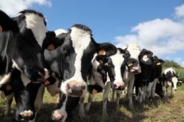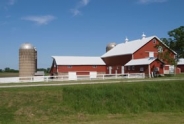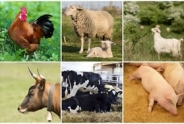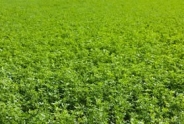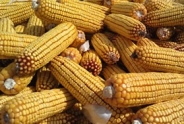The Cold Weather is Coming - Don't Wait Until the Last Minute to Prepare
Kim Morrill, Dairy Management
North Country Regional Ag Team
December 28, 2016
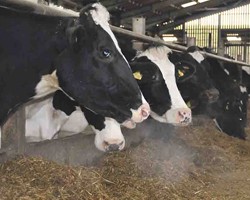
WATER - Regardless of if you have dairy cattle, beef, sheep or goats, water is critical! Livestock require water to maintain their immune system and stay healthy. Decreased water consumption leads to decreased feed intake and decreased milk production. Check water sources throughout the day.
- Lactating animals have increased water requirements compared to non-lactating and youngstock. These do not changes in the winter just because it is cold outside. Look into options to divert the water from the plate cooler to the water tank for the fresh pen, or price out water heaters. Yes, there may be some increased costs in December, January and February but it's likely better than the alternative of decreased milk production and sick cows.
- Yes, even pre-weaned calves require water and yes, I realize water in hutches does freeze when it's -10 (or +20). Having grown up feeding calves in hutches, in NH, I understand it's not a fun job, but having sick dehydrated calves is even worse. Providing warm water shortly after feeding milk is when the calves will get the most benefit. Collect the water buckets 20 to 30 minutes later. This prevents frozen buckets and provides another opportunity to observe the calves.
- Lactating cattle - Often we do not worry about cold stress with lactating dairy cattle because as they ruminate they are producing heat, however if the temperature drops below zero, or cows are not housed in a dry and draft free environment adjustments may be needed to accounted for increased energy needs. Work with your nutritionist to make sure energy needs are being met for cold conditions.
- Feed Inventories - work with your nutritionist (or CCE Specialist) and do a forage inventory. This allows you to know how much feed you actually have available. During the cold months animals need more energy and may deplete already reduced feed inventories much quicker. If you may need to purchase feed, it is better to know early and get a plan in place, then to run out mid-winter.
- CALVES NEED MORE ENERGY!!! When the temperature drops below 600F calves need more energy! Calves have less than 5% body fat and do not have a functioning rumen to help keep them warm. If you do not increase the energy in their diet, they will use the energy to stay warm and will not grow. To improve health, growth and stay warm you want to feed a milk replacer that is formulated for cold weather, feed adequate amounts of milk replacer (make sure the calves get enough MCals/day), milk should be warm when fed, so the calf does not have to use energy to warm the milk while digesting it. Provide each calf with a calf jacket, provide enough bedding so the calves can nest, make sure bedding is clean and dry and make sure the calf is protected from the wind. During extreme cold a third feeding of milk/milk replacer may be needed to get enough energy into the calves when the temperatures drop below zero.
- Udder Care - Udder prep, pre and post is always important, in wintertime it is even more important as chapped or frozen teats are a great place for bacteria to thrive. Unfortunately, freezing temperatures and teat dip don't always mix. Keep using a pre and post -dip, just make sure teats are dry before the cows leave the parlor. Switch from a water based to a glycerin based teat dip. Store teat dips in an area that is less likely to freeze; freezing can inactive some ingredients as well as cause ingredients to separate. Make sure milking systems are functioning properly as well as provide cows with clean, dry housing and protection from the wind.
- Smoke & Fire detectors - Make sure these are in all of your barns and in your house and make sure they work. With all of the heater systems that get set up during winter, safety should be the #1 factor.
- Windows & Doors - Double check that all windows and doors that have been opened during the day (or warmer weather) have been latched to prevent water or other items from freezing.
- Vaccines - Make sure vaccines, medication and other thermal sensitive items are properly stored, or temporarily re-located. A farmer told me it was so cold out that the vaccine was freezing in the syringe, unfortunately, this inactivates the vaccine and provides no benefit to the animal and costs the farmer twice the money as they now have to buy another round of vaccine.
- Space heaters - Space heaters can be the difference between freezing and 330F, but USE WITH CAUTION and COMMON SENSE! Do not place near flammable items such as paper towels or bedding.
- WATER - Dehydration can occur in winter months just as easily as in the heat.
- Clothing - Dress in layers, wear clothes that wick away the sweat. Keep extra clothes in the barn and in your vehicle. If you get wet, don't "tough it out", take a few minutes, but on warm, dry clothes and stay healthy. A few minutes added onto chores is a lot better than frostbite due to wet socks or a week in the hospital with pneumonia due to wet overalls.
- STRESS - Many farmers are already dealing with a high stress load due to the drought, milk prices and challenging margins. Unfortunately, a long cold & snowy winter can increase both stress and depression. To help combat some of the emotional challenges TAKE A BREAK, it's important not to get overwhelmed. This can be as simple as a 15 minute coffee/ hot chocolate break to warm up and catch up with your kids, a trip to town to get a coffee, go visit a neighbor, take your spouse out to dinner and talk about something other than the farm. Additional resources to deal with stress are available at your local CCE offices, from the Regional Ag. Team and FARMNET.
Announcements
No announcements at this time.

